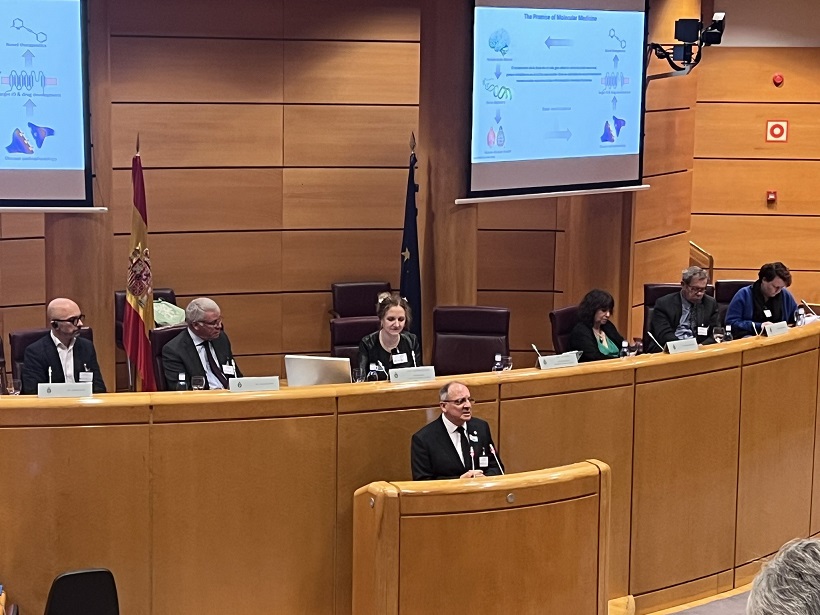The European Brain Council demands brain research for a higher quality of life at the Senate of Spain
28 de November de 2023
The event ‘Our Brains, Our Future: The Value of Brain Research - From Basic to Clinical - to Improve Patient Outcomes in Europe’ was held today in the Senate of Spain within the framework of the Spanish Presidency of the Council of the European Union. This conference, organized by Juan Lerma, a researcher at the del Institute for Neurosciences, a joint center of the Spanish National Research Council (CSIC) and the Miguel Hernández University (UMH) of Elche, and vice-president of the European Brain Council, has highlighted the importance of prioritizing brain health, research, and innovation in Europe.
Several renowned experts, leading scientists, patient advocates, industry representatives, and policymakers, attended this event, which addressed key aspects of brain and health research. Throughout the day, crucial elements in the complex chain that goes from basic neuroscience to improving patient outcomes have been analyzed and explored, with the aim of drawing attention to the need to study the brain and invest in neuroscience and in basic and clinical.
This meeting has also highlighted the need for political action at the European Union level to address the challenges related to brain diseases: “Prioritizing and supporting the advancement of brain health and brain research should be considered urgent and an investment in the future, necessary for the prevention of brain diseases and to ensure the well-being of all citizens,” said Juan Lerma, who presented his work on genes, circuits and behavior during the session dedicated to understanding the brain based on scientific advances.
 Photo: EBC
Photo: EBC
The keynote lecture was given by University of Edinburgh professor Richard Morris, current director of the Remedios Caro Almela Chair of Neurobiology (UMH), who was awarded the Brain Prize in 2016. In his lecture, Professor Morris spoke about the complexity of the brain and pointed out that European scientists play a fundamental role in the contemporary understanding of this organ.
It is also worth highlighting the interventions of Mara Parellada, coordinator of the Comprehensive Medical Care Program for people with autism spectrum disorders (AMITEA), and José Obeso, director of the AC Comprehensive Neuroscience Center (CINAC), who, during the session dedicated to challenges of meeting the needs of patients, they have talked about personalized and precision medicine in autistic disorder and about technological developments for serious neurological disorders, respectively.
The European Brain Council (EBC) is a non-profit organization based in Brussels that brings together basic and clinical scientific societies, patient organisations, professional societies and industrial partners. Its primary mission is, speaking with a single voice, to promote brain health and neuroscience research with the ultimate goal of improving the lives of the estimated 179 million Europeans suffering from brain diseases. This event has had the support of the CSIC and the Spanish Brain Council, which is part of the EBC.
Source: European Brain Council / Institute for Neurosciences UMH-CSIC (in.comunicacion@umh.es)

 Español
Español